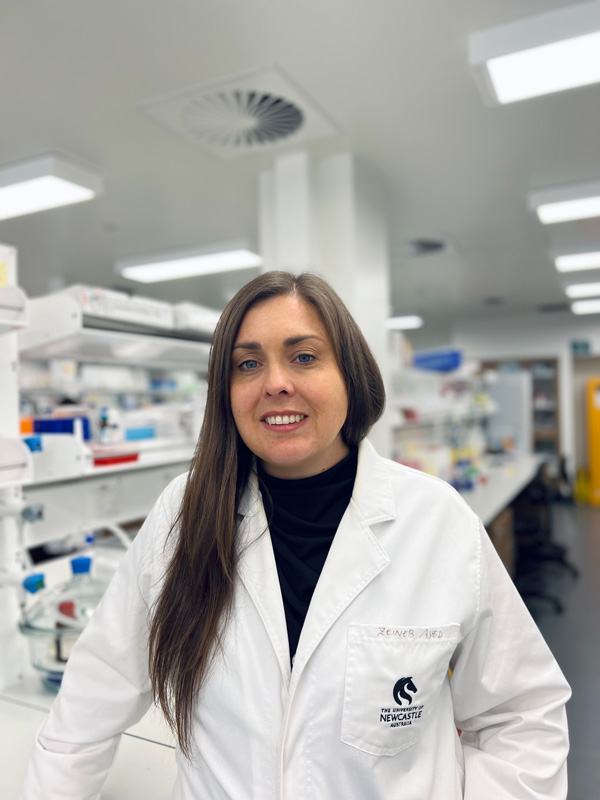Researcher Highlights
Medical research breakthroughs start small
Renee Goreham
Dr Renee Goreham’s interdisciplinary research into natural nanomaterials holds the promise of exciting medical breakthroughs in the areas of drug delivery, disease diagnosis and treatment.

Dr Renee Goreham works at the intersection of biology and nanotechnology. Her collaborative research focuses on the synthesis, characterisation and applications of nanomaterials—extremely tiny chemical substances that can be manufactured and used at small scale for a range of purposes, including novel forms of medical diagnosis and treatments.
Renee’s current work explores the exciting possibilities of custom-designed nanomaterials to target or label cells. She is most interested in nature’s own nanoparticles, called extracellular vesicles, and has been exploring how these natural materials can be used for earlier diagnosis and more effective drug delivery.
“Most living cells release nanosized extracellular vesicles and this area has exploded because of their applications in novel disease diagnosis and biocompatible drug delivery vehicles. My research uses extracellular vesicles for drug delivery by loading them with functional nanoparticles or capturing and detecting them for disease diagnosis.
“If new modes of treatment, detection and diagnosis can be developed, this would not only help patients and their families through difficult times, but also increase the health economy by decreasing hospital stays.”
More than meets the eye
Renee works with nanomaterials ranging in size from one to 100 nanometres. To put this in perspective, a sheet of newspaper is about 100,000 nanometres thick. At this incredibly minuscule scale, Renee explains that nanomaterials exhibit unusual characteristics when compared with the same material on a larger scale.
“I like everything small—more accurately, nanosized! Nanoparticles behave differently compared to bulk material. For example, imagine a lump of gold. Unlike this bulk gold, which does not react easily, nanosized spherical particles of gold form a ruby red solution, are reactive and have a potential use in disease treatment.”
Renee is exploring how a type of nanoparticle, called quantum dots, can be used for biomedical imaging. Quantum dots have been shown to help detect chemical and biological processes and agents, which allows for the identification of biomarkers like proteins and nucleic acids that play a vital role in the early detection of cancers and other diseases.
“I use quantum dot nanoparticles in my research that are fluorescent, due to their small size. Quantum dots are also used in Quantum dot Light Emitting Diode (QLED) TVs, but my research uses them to tag biological processes or for detection of entities, such as extracellular vesicles.”
A strong career trajectory
Renee recognises and champions the need for strong, cross-disciplinary research partnerships to achieve the best results. Her research collaborations stretch across the globe, from Australia to New Zealand and Germany, and she has plans to build these collaborations further over the coming years.
“Getting a team together across all areas of science is crucial to developing world-class research. I always strive to work in teams with an array of expertise and a like-mindedness in the way we perform research. Building each other up and developing a cohesive network is important to me.”
For Renee, prioritising collaboration over competition means also making time to mentor the next generation, and “paying forward” the support she has received from role models throughout her career.
“I have had great role models and mentors who were pivotal to my success. In the same way, I am passionate about supporting other young researchers. I believe in helping and mentoring others.”
This naturally curious researcher is just getting started in her career and has no plans to slow down. In collaboration with some of the brightest minds at the University of Newcastle and around the globe, Renee hopes to continue advancing medical outcomes by delivering even greater research insights in the near future.
“I want to become a world-renowned researcher in the area of nanotechnology, which means continuing to build my research group over the coming years and producing high-class research in my field. I have an addiction to research—discovering the unknown is my biggest driver!—and I’m proud of how much I’ve achieved already.”
The University of Newcastle acknowledges the traditional custodians of the lands within our footprint areas: Awabakal, Darkinjung, Biripai, Worimi, Wonnarua, and Eora Nations. We also pay respect to the wisdom of our Elders past and present.